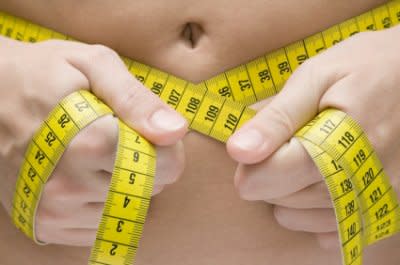5 Ways to "Cheat" on Your Diet and Still Lose Weight

When it comes to making over your body, the journey truly is the destination. But just because it's a long, arduous process-not to mention an opportunity to demonstrate supreme willpower-doesn't mean you can't also have a little fun along the way. In fact, if you don't loosen the reins on your dieting habits once in a while, you're likely to end up even more dissatisfied-and possibly even heavier-than you were before you started your mission to be a lean, mean fighting machine. With moderation in mind don't be afraid to "cheat" on your diet in the following ways.
1. Enjoy Red Meat Some dieters avoid red meat at all costs, unable to see beyond its high saturated-fat content, known to raise levels of blood cholesterol. But beef in particular, according to Shalene McNeil, executive director of nutrition research for the National Cattlemen's Beef Association, is also "one of the most nutrient-rich foods. One three-ounce serving of lean beef contributes only 180 calories, but you get ten essential nutrients." These include iron, in which many teenage girls and younger women are deficient; protein, which optimizes bone and muscle function; and vitamin B12, which contributes to the health of nerves and red blood cells. By limiting your intake to smaller portions and lean cuts, you can feel good about making red meat a part of your diet.
10 Steps to Grilling the Perfect Burger
2. Give Fructose a Chance Fructose, a sugar that occurs naturally in many fruits and vegetables but that also is a primary component of high-fructose corn syrup, has gotten a bad rap recently from certain researchers, who have suggested that fructose may initiate a hormonal reaction linked to weight-gain, or trick us into feeling hungrier than we actually are. But many other nutrition experts disagree, including biochemist John S. White, who told WebMD, "I believe recent allegations suggesting that fructose is uniquely responsible for the current obesity crisis in the U.S. are unfounded. These allegations-such as increased fat production or increased appetite-are based on poorly conceived experimentation of little relevance to the human diet." Certainly, overconsuming fructose can cause weight gain, but so can eating too much of almost anything else. Simply adopt a reasonable approach to this maligned ingredient by restricting your intake of fructose-sweetened snack foods and drinks while dieting, just as you would with any other simple carb.
7 Things You Shouldn't Eat for Breakfast
3. Indulge in a Treat Now and Then The mere idea of "cheating" on a diet fills some people with horror, yet many experts believe occasional culinary indulgence is one of the best ways to stay on track. Howard J. Rankin, author of 7 Steps to Wellness, explains, "What works when dieting is progress, not perfection. Perfectionists are poor dieters because they inevitably fail to maintain their perfection, and eventually they quit." Keep in mind that it takes a lot more than one night of gluttony to derail your progress toward a slimmer figure-your body reflects your cumulative eating habits, not what you put away in a single meal, even if it's fried chicken and ice cream. Think about it statistically: if you allow yourself one "freebie" meal each week out of twenty-one total, that means you're eating poorly less than 5 percent of the time-certainly not enough to prevent you from realizing your nutritional goals. The most important thing, says Livestrong.com, is to plan your food indulgences in advance, integrating them at regular intervals into your diet. By making treats an "official" part of your eating plan, you'll remove the guilt associated with them-and have something to look forward to each week.
4. Drink a Glass of Wine Alcoholic beverages may constitute "empty calories" when you're swilling piña coladas, but there's nothing meaningless about including red wine in your diet-especially pinot noir, which contains the most disease-fighting antioxidants of any alcohol, including resveratrol, which many doctors credit with preventing blood clots and damage to blood vessels and decreasing "bad" cholesterol. Men's Health claims your best bet is a Santa Barbara County pinot noir with a vintage between 2002 and 2004, "generally recognized as the top wine-producing years for this finicky grape." Salud!
The Health Benefits of Red Wine
5. Buy Nonorganic When you're dieting, finding the most healthful and best-tasting ingredients possible is top of mind, and many people believe that eating organic as much as possible is the most effective way to achieve this goal. However, not only does the "organic" label in the United States mean different things in different contexts, but organic items don't necessarily have more integrity than conventional options. For example, according to a March 2008 Marie Claire article, organic farming is not nearly as efficient as nonorganic, and therefore requires far more land to produce the same amount of food. In addition, many popular organic brands (such as Boca Burger and Morningstar Farms) are owned by megacorporations that often import organic ingredients from other countries to keep costs down-bad news for you locavores out there. Finally, no nutrition study yet has proven that organic produce actually tastes better than-or even has a definite nutritional edge over-nonorganic fruits and veggies. The safest means of ensuring that your food tastes good and does your body good is to buy locally grown, in-season produce that hasn't been sitting on the store shelf for more than a day or two. As for snack foods, a chip is a chip and a cookie is a cookie, and no amount of "organic" labeling or ingredients can change that.
See more diet-friendly indulgences!
More from Divine Caroline:
7 Healthy Diet Changes You Can Make Today
How Different Workouts Shape Your Body
The Wackiest Deep-Fried Foods
6 Signs Your Bra Doesn't Fit
Connect with DivineCaroline:
Follow us on Twitter!
Find us on Facebook!
Share your story on DivineCaroline